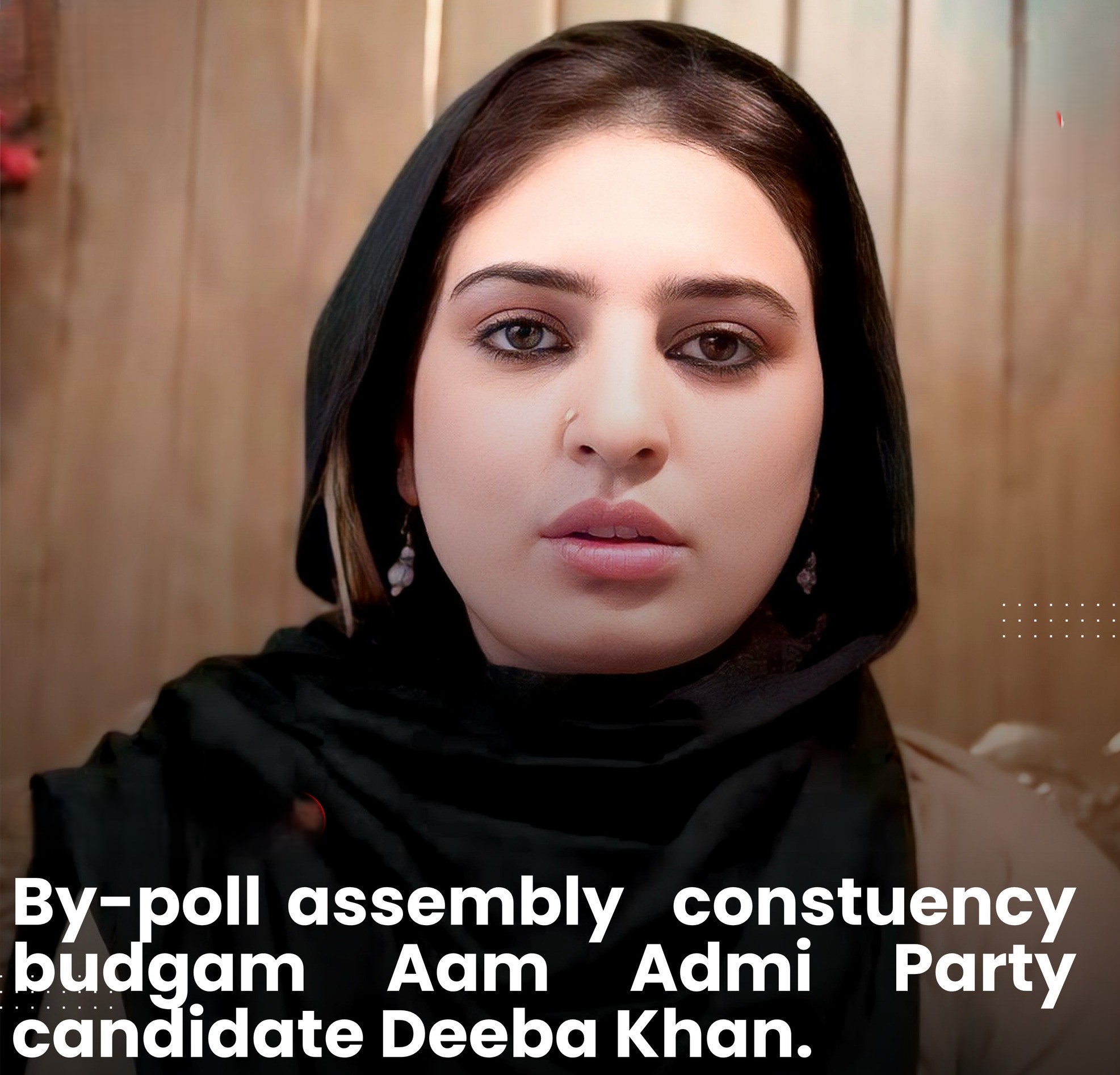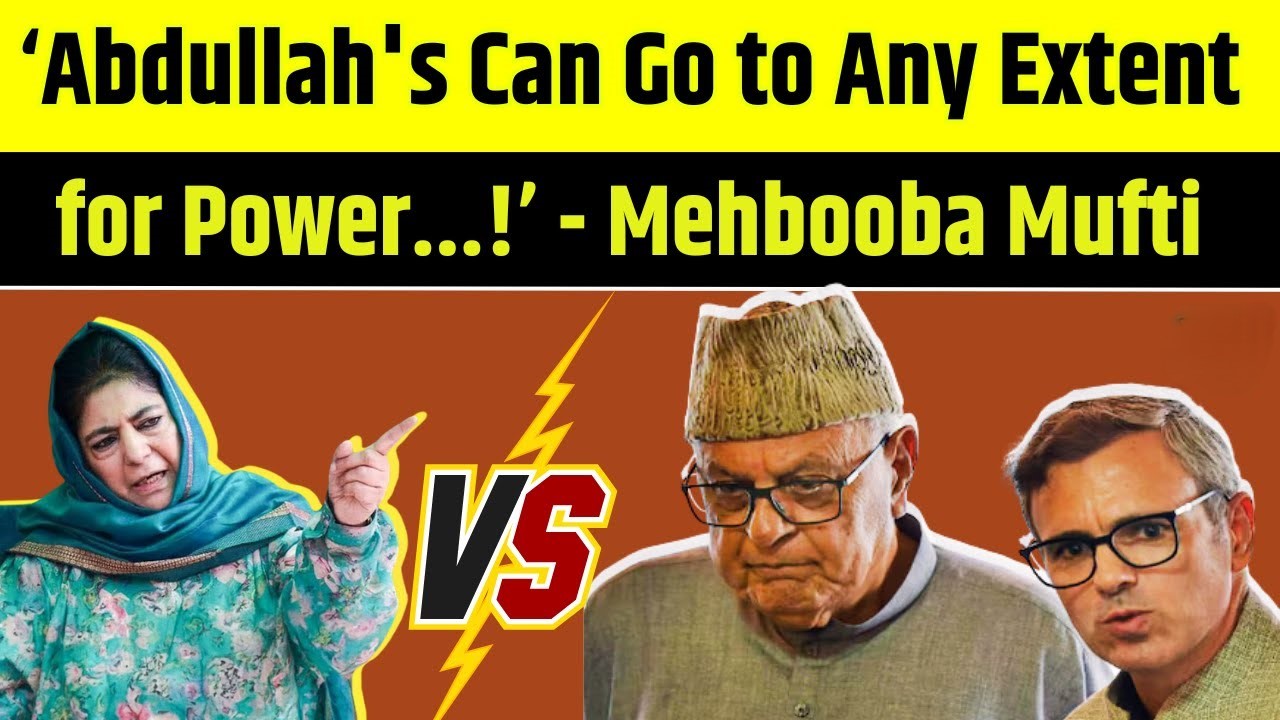“PSA ka badla vote se”: AAP’s Deeba Khan Enters Budgam Bypoll 2025 with Bold Political Message
By: Javid Amin | 20 October 2025
A Slogan That Echoes Far Beyond Budgam
A new voice has entered the electoral fray in Kashmir, and it comes wrapped in a slogan that reverberates through the region’s fraught political past: “PSA ka badla vote se.”
With those words, Deeba Khan, the Aam Aadmi Party’s (AAP) candidate for the Budgam Assembly bypoll, has sparked a new kind of political conversation in Jammu and Kashmir — one that blends protest with participation, grievance with governance, and dissent with democracy.
Her nomination marks AAP’s most assertive political entry into the Valley yet, signaling an attempt to reshape the political discourse from the ground up — from outrage to organized civic action.
The bypolls for Budgam and Nagrota, scheduled for November 11, may involve just two seats. But for AAP — and for Kashmir’s larger democratic experiment — they represent a chance to redefine the tone and language of regional politics.
The Political Context: Bypolls in a Changing Kashmir
Budgam’s by-election comes at a critical juncture. The seat fell vacant after Chief Minister Omar Abdullah chose to retain his Ganderbal constituency following his 2024 victory, leaving Budgam open for contest once again.
Since then, the constituency — long considered a National Conference (NC) stronghold — has become a stage for a broader ideological confrontation: traditional dynastic politics versus emerging reformist alternatives.
For decades, Kashmir’s mainstream politics have been dominated by the National Conference (JKNC) and the Peoples Democratic Party (PDP), with BJP attempting to make inroads, primarily through religious and regional polarization.
Now, AAP’s entry into Budgam — with Deeba Khan as its face — introduces a fourth political axis: an urban, reform-oriented, governance-focused platform inspired by Delhi’s model of accountability and service delivery.
“People in Kashmir are exhausted by promises and slogans that go nowhere. This time, the slogan is about using our vote as our voice,” Deeba Khan told supporters after filing her papers at the District Election Office.
Deeba Khan: A Fresh Face with a Sharp Message
Who Is Deeba Khan?
Deeba Khan, a social worker, educator, and rights activist, has spent the past decade involved in community-based initiatives in central Kashmir, particularly in women’s education, youth skill development, and civic participation programs.
Her entry into politics through AAP isn’t accidental — it reflects the party’s evolving Kashmir strategy, which aims to position itself as a people-first alternative to legacy parties.
While she lacks the family legacy that many Kashmiri politicians carry, Khan’s authenticity — and her ability to connect emotionally with first-time voters — is her biggest strength.
Her slogan “PSA ka badla vote se” isn’t just rhetorical; it encapsulates a deeper sentiment across Kashmir — the idea that political transformation can’t happen through protests alone, but through structured participation.
Understanding the Slogan: “PSA Ka Badla Vote Se”
The Public Safety Act (PSA) has long been one of the most contentious laws in Jammu and Kashmir, allowing preventive detention for extended periods without trial. Thousands have been detained under its provisions over the years — from political activists to ordinary citizens.
By invoking the PSA directly in her campaign, Deeba Khan isn’t just critiquing a law — she’s reframing a narrative: from victimhood to agency, from anger to accountability.
“If you want change, stop letting others decide your fate. Use your vote as your protest. That’s our message,” she told a rally in Beerwah.
This messaging represents a subtle but significant strategic shift — one that aims to convert disillusionment into democratic energy.
Where older parties have focused on restoring pre-2019 autonomy or statehood, AAP’s approach here is bottom-up, focusing on empowerment within the existing framework — education, employment, and corruption-free governance.
The Budgam Battleground: Old Guards vs. New Voices
Budgam’s political landscape is both symbolic and complex. It is home to deep-rooted loyalty networks, tribal communities, and a new generation of digital-savvy youth.
The constituency has traditionally supported JKNC, but cracks have been visible since the 2024 elections, with PDP and BJP attempting to exploit the vacuum left after Omar Abdullah’s seat shift.
Now, AAP’s Deeba Khan adds another dimension to this contest — a civic, issue-based campaign in a field dominated by emotive politics.
Key candidates for Budgam bypoll 2025:
-
JKNC: Agha Syed Mehmood (veteran leader, former minister)
-
PDP: Agha Syed Muntazir Mehdi (youth-focused leader)
-
BJP: Agha Syed Mohsin (cleric and community figure)
-
AAP: Deeba Khan (rights activist and reformist)
While Mehmood and Mehdi represent continuity within dynastic lines, and Mohsin symbolizes BJP’s strategic outreach, Deeba Khan stands apart as a challenger without baggage, appealing to voters who are politically aware but ideologically untethered.
Ground Sentiment: “We’ve Tried Everyone — Let’s Try Change”
Field surveys and early campaign reports indicate a growing curiosity around AAP’s campaign style in Budgam.
While JKNC maintains a loyal older base, and PDP continues to hold pockets of youth support, AAP’s issue-based approach — especially its promises of power reform, public audits, local transparency, and education for girls — is striking a chord with urban and semi-urban voters.
“She talks like us, not at us,” says Irfan Dar, a 27-year-old shopkeeper in Budgam town. “Even if she doesn’t win, she’s saying things others are afraid to say.”
Local observers note that AAP’s volunteer model — door-to-door outreach, social media micro-campaigns, and clean, low-cost rallies — is new to Kashmir’s electoral culture, which has often revolved around patronage networks and symbolic leadership.
The Ripple Effect: AAP’s Growing Presence in J&K
This bypoll marks AAP’s first serious attempt to establish electoral credibility in Jammu and Kashmir.
The party is simultaneously contesting the Nagrota seat in Jammu region, a constituency where it hopes to tap into anti-incumbency sentiment against the BJP and connect with urban middle-class voters who are frustrated by governance stagnation.
Over the past year, AAP has:
-
Opened district-level offices in Srinagar, Jammu, Budgam, and Baramulla.
-
Built a network of youth coordinators and local committees.
-
Focused on electricity, healthcare, and corruption-free administration as entry points for voter engagement.
While AAP’s vote share in 2024 was negligible, analysts note that Deeba Khan’s campaign could be the party’s political turning point, much like its early experiments in Delhi’s civic polls a decade ago.
“Even 5–10% vote share in Budgam would mark the start of a political foothold,” says political commentator Shafiq Rather. “It’s not about winning; it’s about beginning.”
What Deeba Khan Represents: From Protest to Participation
For decades, Kashmir’s political engagement has oscillated between street protests and election boycotts.
Deeba Khan’s entry reframes that relationship — protest through participation.
Her slogan and candidacy encapsulate three major shifts in political psychology:
-
Electoral Resistance — transforming dissent into democratic assertion.
-
Civic Literacy — teaching people that voting itself is a form of empowerment.
-
Gender Inclusion — a young woman leading a rights-driven campaign in central Kashmir is unprecedented in recent years.
Her rise also coincides with a broader national trend — an increasing number of educated, independent women entering politics through issue-based platforms rather than family inheritance.
Comparing Campaigns: The New vs. The Known
| Candidate | Party | Core Message | Voter Target | Strengths | Weaknesses |
|---|---|---|---|---|---|
| Agha Syed Mehmood | JKNC | “Trust & Legacy” | Rural elders, loyalists | Experience, networks | Anti-incumbency fatigue |
| Agha Syed Muntazir Mehdi | PDP | “New Leadership for New Budgam” | Youth, reformists | Digital appeal, energy | Organizational weakness |
| Agha Syed Mohsin | BJP | “Development over Dynasties” | Moderate voters | Central support | Ideological resistance |
| Deeba Khan | AAP | “PSA ka badla vote se” | Youth, women, first-time voters | Fresh face, issue-driven, symbolic clarity | Limited base, organizational infancy |
This table reveals the structural asymmetry of the contest: AAP is not playing by old rules — it’s disrupting them.
Election Schedule: Key Dates
| Event | Date |
|---|---|
| Nomination Filing Deadline | October 20, 2025 |
| Scrutiny of Papers | October 22, 2025 |
| Withdrawal of Candidature | October 24, 2025 |
| Polling Date | November 11, 2025 |
| Counting & Results | November 14, 2025 |
Larger Political Implications
01. For AAP: Testing the Waters
If AAP manages even a modest performance, it will:
-
Cement its presence as a credible fourth force in J&K politics.
-
Offer a model for urban civic politics in Kashmir.
-
Attract educated youth and apolitical professionals.
02. For JKNC & PDP: Pressure to Reform
AAP’s clean, policy-based campaign could pressure traditional parties to shift focus from emotional narratives to performance-based governance promises.
03. For BJP: A New Competitor in Jammu and Central Kashmir
AAP’s parallel contest in Nagrota and Budgam cuts into BJP’s “development” narrative, forcing it to defend its record on jobs, security, and local governance.
Expert Insights: The Political Psychology of Budgam 2025
Dr. Rafiq Makhdoomi, a political scientist at Kashmir University, observes:
“This election isn’t just about who wins Budgam. It’s about which political language wins — the language of legacy, identity, or governance. Deeba Khan represents governance.”
Political observers agree that while AAP is unlikely to win outright, its symbolic intervention could reshape voter expectations in future elections, particularly municipal and local body polls.
Social Media & Youth Outreach
Deeba Khan’s team has launched a coordinated online campaign:
-
Instagram reels featuring her field visits.
-
WhatsApp micro-groups for voter awareness.
-
Live discussions on women’s participation in politics.
-
Simplified explainers on PSA, RTI, and electoral rights.
This bottom-up mobilization strategy mirrors AAP’s original Delhi playbook — relying on storytelling, relatability, and grassroots organization instead of heavy spending.
Gender and Representation: Breaking a Glass Ceiling in Budgam
Budgam has rarely seen women candidates in major assembly contests. Deeba Khan’s candidacy is therefore politically symbolic and culturally transformative.
Her visibility challenges patriarchal assumptions in Kashmiri politics, where women’s roles have often been confined to background mobilization.
“I’m not here to fill a gender quota. I’m here to rewrite the language of politics,” she said at a campaign launch.
This has inspired women’s groups, educators, and social activists who see her rise as a turning point in Kashmir’s political inclusivity.
The Road Ahead: More Than a Contest
As campaigning intensifies, Budgam 2025 is beginning to feel less like a local bypoll and more like a referendum on political evolution in Jammu & Kashmir.
If Deeba Khan manages to make a significant dent in vote share, it will validate a new political vocabulary rooted in governance, gender equality, and civic empowerment.
If she doesn’t, her campaign may still become a political case study — proving that the Valley’s youth are ready to talk about rights and reform through ballots, not barricades.
Botom-Line: A New Chapter Begins
The slogan “PSA ka badla vote se” isn’t just campaign rhetoric — it’s a generational statement. It represents a shift in Kashmiri politics from reaction to reform, from disillusionment to determination.
Whether Deeba Khan wins or not, she has already succeeded in changing the narrative — from how elections are fought to how people think about them.
In a region where politics has often been about identity, her campaign reintroduces the forgotten idea that governance, rights, and civic dignity can also be the basis of politics.
“We have protested enough. Now we participate.” — Deeba Khan, Budgam 2025.



